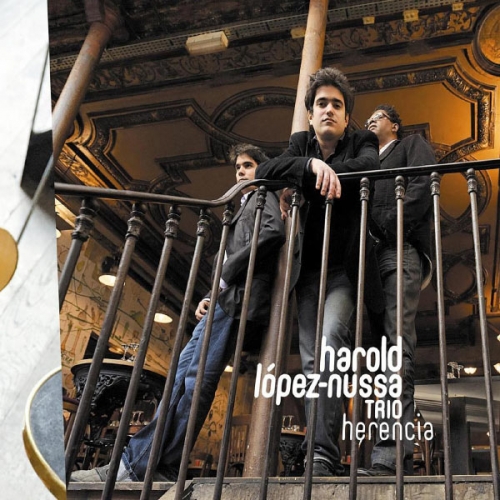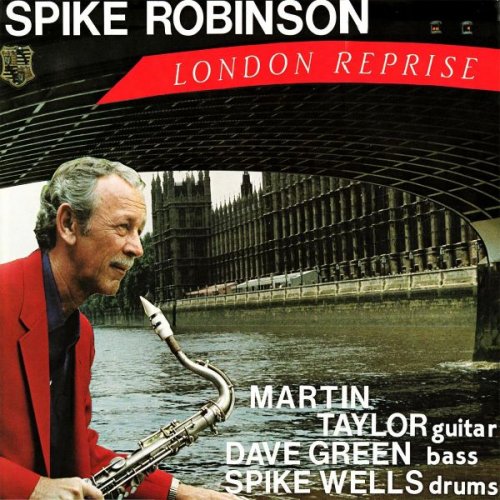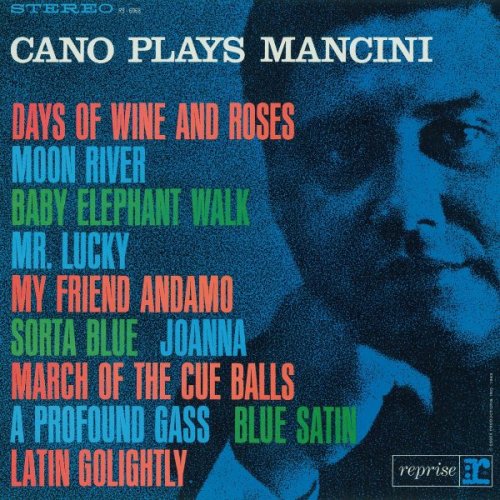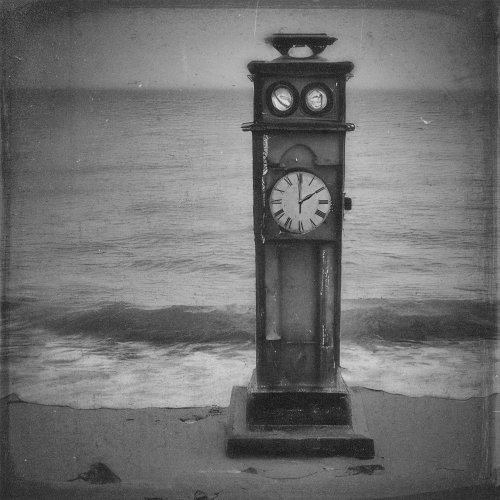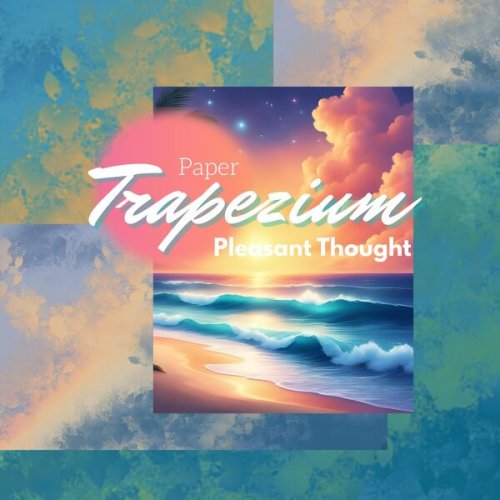Max Roach & Clifford Brown Quintet - Jordu (1954)
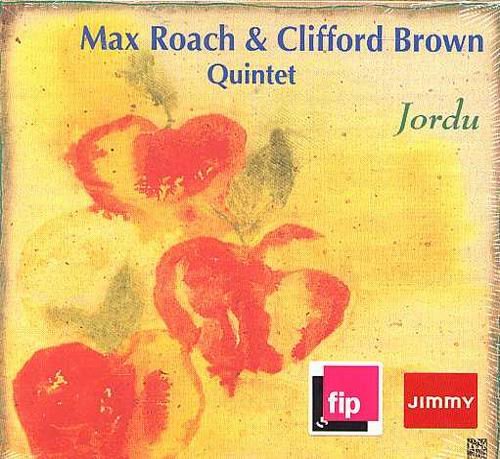
Artist: Max Roach & Clifford Brown Quintet
Title: Jordu
Year Of Release: 2005
Label: Dreyfus Jazz [FDM 36780-2]
Genre: Jazz, Bop
Quality: FLAC (image + .cue,log) | MP3/320 kbps
Total Time: 72:50
Total Size: 447 MB(+3%) | 172 MB(+3%)
WebSite: Album Preview
TracklistTitle: Jordu
Year Of Release: 2005
Label: Dreyfus Jazz [FDM 36780-2]
Genre: Jazz, Bop
Quality: FLAC (image + .cue,log) | MP3/320 kbps
Total Time: 72:50
Total Size: 447 MB(+3%) | 172 MB(+3%)
WebSite: Album Preview
1.Jordu
2.I can't get started
3.I get a kick out of you
4.Parisian thoroughfare
5.Tenderly
6.Sunset eyes
7.Clifford's axe
8.All God's chillun got rhythm
9.Joy spring
10.Delilah
11.Daahoud
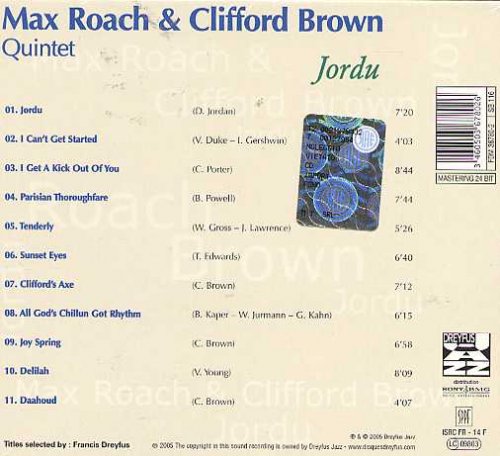
personnel :
Clifford Brown - trumpet
Harold Land - sax tenor
Richie Powell - piano
George Morrow - bass
Max Roach - drums
Teddy Edwards - sax tenor - 5, 6, 7, 8
Carl Perkins - piano - 5, 6, 7, 8
George Bledsoe - bass - 5, 6, 7, 8
“If any musician of the present day can be compared to Charlie Parker, it’s Clifford...”. As put by another brilliant young man, Quincy Jones, at the age of 20 in 1953, when he was then siding Clifford Brown, 23 years old, in the trumpet section of Lionel Hampton’s big band. Fifty years on, Quincy’s opinion is shared by everyone, or almost. This prodigious trumpeter was endowed with every aspect of a genius. He boasted a rich imagination and had the means of passing on his many ideas. His playing was also keenly sensitive. He had concentrated on his playing whole-heartedly ever since his father offered him a trumpet at the age of 15. He controlled his warm and powerful sound with great skill, in the same way he mastered the vibrato and articulation of the notes and phrasing, regardless of the tempo. Fortunately, he was recorded in quantity between 1953 – when he truly debuted, after being laid up in 1950-1 for a year and a half following a car accident – and 26 June 1956, the date of another accident which this time proved fatal. Just before his twenty-sixth birthday, this extraordinary musician disappeared, who we now listen to with admiration and emotion, and as if all these gems he passed down had only been recorded yesterday, as they have remained as fresh and streamlined as ever. Here, we find him in spring and summer 1954. In April, Max Roach, just ending a six-month contract as house drummer in the Lighthouse Club in Los Angeles, was offered by promoter Gene Norman to form a quintet. Max immediately thought of Clifford Brown who he had known in Philadelphia and had since followed his growing reputation. He hired Sonny Stitt on the tenor sax, but he seemed to lack engagement and after five weeks was replaced by Teddy Edwards who had recently concluded a one-year stint in San Francisco’s Bop City after being a member of the Los Angeles’ Lighthouse All Stars. On the bass, Roach hired George Bledsoe, who he later described as “a wonderful singer”. And on the piano the great Carl Perkins took the stool for a short while. It was during his billing at the California Club that the group gave a concert at Pasadena’s Civic Auditorium. The recording of this concert engendered two particular masterpieces, two of the most beautiful phonographic vestiges left by Clifford: Tenderlyn Clifford’s Axe, a masterly improvisation lasting seven minutes adopting the harmonies of Gershwin’s song, The Man I Love. However, we mustn’t overlook Clifford’s terrific trumpet solo in All God’s Chillun Got Rhythm. Regarding the quintet’s recording of August 1954, in the studios then at the Crescendo, we can notice that Teddy Edwards had been replaced by another California-adopted artist, Harold Land. As Teddy’s wife was heavy with child, he didn’t want to travel. Clifford introduced Harold to Max Roach during a jam session held at Eric Dolphy’s place. And Richie Powell, Bud Powell’s younger brother, who had just quit saxophonist Johnny Hodges’ band while the leader was having a break from Ellington, fitted comfortably as Carl Perkins’ replacement. The new group, at the dawning of a short but prolific career, rapidly fashioned a repertory which was to deeply touch lovers of good jazz: Jordu, composed by pianist Duke Jordan and especially Joy Spring and Dahoud, magnificent tunes signed by Clifford himself, are still played, sung and whistled throughout the world. And we will most certainly join in after listening to this CD.


![VA - From the Archive Vol. 3... compiled by Volcov (2026) [Hi-Res] VA - From the Archive Vol. 3... compiled by Volcov (2026) [Hi-Res]](https://www.dibpic.com/uploads/posts/2026-02/1772033794_a3743742618_10.jpg)
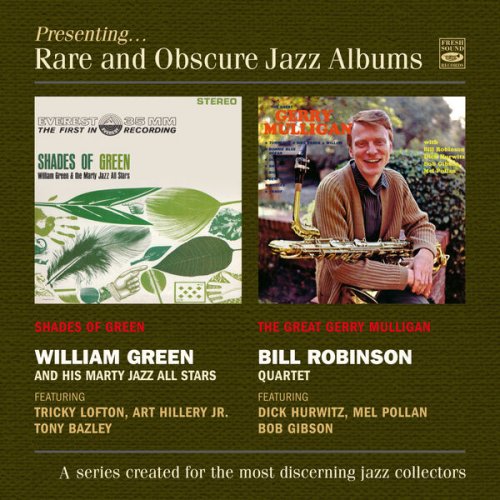
![Vince Guaraldi & Bola Sete - From All Sides (Remastered 2026) (1965) [Hi-Res] Vince Guaraldi & Bola Sete - From All Sides (Remastered 2026) (1965) [Hi-Res]](https://www.dibpic.com/uploads/posts/2026-02/1772124624_cover.jpg)
